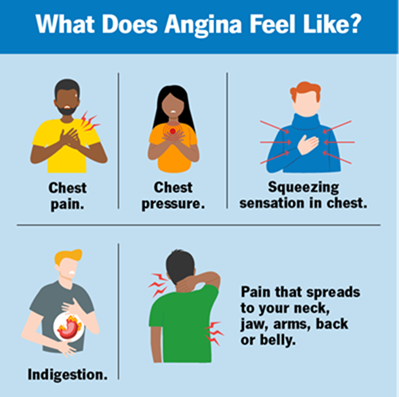Angina is a common symptom of heart disease. Angina is a type of chest pain caused by reduced blood flow to the heart. it is usually caused by Narrowing (but not blocked) coronary artery, which feed blood to heart. A lack of blood flow means your heart muscle isn’t getting enough oxygen. The pain is often triggered by physical activity or emotional stress. angina does not cause permanent damage to the heart.

Angina is often described as squeezing, pressure, heaviness, tightness or pain in the chest. It’s not usually life threatening, but it’s a warning sign that you could be at risk of a heart attack or stroke.

Symptoms
Common symptoms include pain in the upper body and other symptoms of angina may include –

- Shortness of breath
- Chest pain
- Extreme tiredness
- Light-headedness or fainting
- Nausea, or feeling sick to the stomach
- Heartburn or indigestion
- Sweating
- Weakness
Angina symptoms may start when
- Often during physical activity or exercising.
- Emotional stress or worried.
- When you are in a very cold place.
- Anger
Meditation and Healthy Lifestyle help to manage Angina, for Meditation you can visit doctor clinic for treatment.
Healthy Lifestyle to manage Angina
Changes lifestyle to keep the heart healthy is an important part of angina treatment. Some healthy Lifestyle tips given below. Please try these –
Exercise. Regular exercise for about 30-40 minutes should be done to boost the heart pumping process, which helps to inhale excess oxygen in the body, thus, keeping the heart healthy. so do plenty of aerobic exercise, such as walking, swimming, or bicycling, at least 3 to 4 days a week aiming for at least 150 minutes per week. Regular exercise and activity also help control diabetes, high cholesterol and high blood pressure all risk factors for heart disease. If your angina occurs with activity, pace yourself and take rest breaks. talk to your health care team about starting a safe exercise plan. If your angina occurs with activity, pace yourself and take rest breaks.
Emotional health. Get checked and treated for depression, if needed.
Reduce Stress – Avoid or reduce stress as much as you can. Excessive stress can trigger anginal pectoris because it suppresses the heart pumping capacity and transports lesser oxygen to the body, reducing metabolism. Find the ways to help reduce emotional stress. Meditation and mindful breathing can help to reduce stress.
Maintain a healthy weight – Manage weight, Strive for a body mass index (BMI) from 18.5 to 24.9 and a waist smaller than 35 inches (90 centimeters). Excess weight results from heavy fat deposition in the body, which can hamper the blood circulation process in the body. And the higher bad cholesterol levels can cause heart troubles.
Stop Smoking .- Do not smoke or use tobacco. quit smoking, If you smoke. If you need, talk to your health care team about therapies that can help.
Stop Drinking alcohol – If you drink stop it or limit yourself.
Treat medical conditions – Treat your health conditions that can increase your risk of angina, such as diabetes, high blood pressure and high blood cholesterol.
Eat a healthy diet – Eat a healthy diet with limited amounts of saturated fat, trans fat, salt and sugar. Include a variety of fruits and vegetables, whole grains, lean meats, and low-fat dairy products in your diet. Include heart-healthy foods like nuts, fish, chicken, omega-3 rich foods, vegetables, and fibre which keep the heart healthy; they should also be consumed to restrict intake of fried, junk, salty, and sugary foods to lower the chances of plaque deposition in the artery.